You asked to meet up at Central Park by the pond. It is November, so everything is shades of brown and orange and yellow, besides the geese, who are stubbornly gray and black. I arrive first, so I pick a bench and sit looking out at the water. I brought a book along, Sputnik Sweetheart. The day after the party, I went out and bought it, driven by some odd determination. The bookstore bookmark is still wedged between the pages where the cashier slipped the receipt.
You arrive fifteen minutes late and start fast-walking when you see me. You’re wearing a little green coat and red scarf, somehow without being Christmasy, and a black skirt. “Sorry I’m late,” you say, a cloud of hot air coming out of your mouth. I watch the cloud spread out and fade away. Your hair is back in a long braid and your cheeks are flushed.
“No problem, I was too.”
“Well, good.”
I fidget with my scarf, then see you are doing the same, and stop.
You break the silence. “I guess we should probably talk about the party?”
I give you an awkward smile. “You were kind of pulled into it, I feel bad.”
“Not at all. It’s just all really intense. Has that sort of thing happened before?”
I shake my head, “Not like that. But sometimes I feel like we are all close to violence in a way, right? Like there’s this thin line that we don’t cross usually, until someone does. Especially between people.” You draw your eyebrows together, considering.
“I guess you’re right, I just never think of it that way. It’s kind of scary,” you laugh as if to lighten the mood, and I suddenly feel bad.
“She’ll be fine, though, really,” I say lamely, trying to catch your eye. When you look back though, I feel unsure again. When I finally break away and look down, I find myself watching your hands again, and they are dancing around in your lap, never still. I think of the stillness of my apartment after everyone left.
“I hope so,” you say.
I open my book and flip through the pages, listening to them shuffle. “I was really struck by what you said at the party, about wishing you were a Murakami woman.”
***
I don’t know whose fault the party was, really. I think it started as a late birthday celebration for Stella and then was postponed too many times for that to make sense anymore, before it finally ended up at my apartment on November 18th, as some type of Friendsgiving. I thought Friendsgiving was stupid, but Stella and Mike really leaned in, and then we all went along with it. I just didn’t like eating much, and I think Stella secretly agreed, which made the whole thing an emotional conflict for her, which she, I guess, enjoyed.
It was us three, plus Stella’s boyfriend Christian, and then Lenora, my roommate Dante, and you. Those were the people who mattered, anyway. A small thing, Stella promised me. Stella was really into intimacy, and her latest idea was dating your friends, which meant hosting themed parties and sending platonic love letters and things like that. The first letter she sent me was inside a pink envelope and was covered in stickers, addressed in calligraphy lettering. It was all about memories from freshman year, and I wasn’t sure it even applied anymore. One of the memories was of a party around this same time, in which we had slept together on the carpet of someone’s dorm, spooning for warmth. When I thought back, I couldn’t remember this party at all, and thought she might have mixed me up with someone else.
***
Stella and Christian were breaking up at the party. We could all tell something was going to happen between them, but Stella told me beforehand that she was sick of his shit and she was finally going to do it. I was in my bed with no pants on at the time, cradling my phone next to my ear, resting my head on my knees.
“Well, how are you going to do it?” I asked her.
“God, I don’t know, is it bad to do it at the party?”
“Yeah,” I replied, “please don’t do that.”
There was a short silence on the phone. Then, she said “I just don’t think I can do it alone, when it’s just the two of us. I don’t think he’ll understand and then I’ll just let it slide.”
“I don’t know, Stel, but you shouldn’t, let it slide, I mean. It’s okay if he doesn’t understand, honestly.”
They came to the party together, and Stella was smiling too broadly. She gave each of us a hug and set some mashed potatoes on the table. Christian looked surprisingly handsome that night I remember, and was giving everyone small smiles. I never knew him that well but I knew that they would not last, so I avoided eye contact.
It happened right before dinner, for some reason. There were way more people there than Stella had said, and I was trying to keep things together. All the windows were open as wide as they would go, and cold air rushed in from all sides, unsettling the tablecloth and pulling petals off of flowers. I could see them across the room, though, heads bent together. Stella said something and scrunched her face up in the way she does when she is sad. Christian stood very still for a long time. Because he was still, Stella became still also, and their faces were so close and illuminated with the yellow light of a nearby lamp, they reminded me of old porcelain dolls, cracked and tarnished. Then, I saw him grab her arm a bit roughly and shake it, which made her recoil and try to push him away, which I guess made him angry. I heard the word ‘bitch!’ but I think that was only the end of what he said. The eyes of the party were shifting onto them as she finally broke free and walked away, towards my bedroom. She shut the door behind her, and I could hear, even from across the room, the click of the lock.
***
At the dinner table, I sat between Lenora and Stella, who was sitting next to Dante who was sitting next to Mike. We had dimmed the lights and lit candles and tried to make things festive and for the most part succeeded, though there was still an air of somberness, probably because of the fight. Christian sat on the far end of the table and honestly, I don’t know why he was still there, why no one had thought to make him leave.
“Thanks guys for coming, and obviously thank you for hosting,” Stella said looking at me. I smiled back at her quickly. “I’m really grateful to have you all as friends.” Her eyes were glassy and red, but she was not crying and there was no wobble in her voice. I felt like I should do something, but I couldn't think of what, so I just clinked my glass with hers and took a drink. Stella was always teetering on an edge, but she never seemed to fall.
No one else had any speech to give, so we just started eating. Lenora brought up the topic of Murakami. “I just read Kafka and honestly I think it’s the best book I’ve read in a long time,” they said, at first to no one and then directed at me when our eyes met. I nodded a bit.
“I liked it, but wasn’t his relationship with that woman a bit weird? With the age gap?” Lenora nodded, “For sure, but you have to read it like art, like a metaphor, you know? In the context of what he is saying, it makes sense, same as the cat killing and all that, but if you think of it as real life, then yeah, it’s fucked. I guess I just like how he isn’t afraid to talk about sex and love in a different way.”
“I can never tell if he writes such horny shit because he doesn’t get laid, or because he does,” Stella said, which made me laugh. “But god, the women in those books!” “I know, it’s bad. I almost feel like all his main characters, even the little boy, are author-inserts, and he uses them for his fantasies,” Lenora said.
“I mean what’s really wrong with them, though?” Mike asked from down the table, having to raise his voice to be heard. Stella made a little hmph sound, like she was ready to argue.
“The women are all pale and soft, or otherwise saggy and old, and examine themselves in the mirror. It’s like they are either completely innocent to their sexuality or completely aware of it and use it against men, like some sort of weapon,” I said.
“Femme fatales,” Stella added.
Mike took a large bite of mashed potatoes, and I could see the wheels in his head turning, working on something. “I mean I guess, but I don’t think that’s all together inaccurate. Like, there are a lot of women out there. I know some like that, who use their looks or whatever. He just writes from the male point of view – you can’t always be mad about that.”
“You haven’t even read his books, Mike, so I feel like you can shut up,” Stella said. He raised his hands in the air as if regretful. I felt like this conversation could take a turn.
“He writes about lesbians too; he loves lesbians,” Dante said loudly, looking right at me. “Why are you looking at me?”
He shrugs, smiling, because it is obvious. I make a face at him back.
“He just writes about women kissing because it turns him on, not because he actually respects lesbians,” Lenora said. I took a long sip of my drink and got dizzy for a second before it settled.
“Come on, is it really that deep though?” Mike asked, red in the face.
“Mike, fuck off about it if you are going to be so misogynistic,” Stella snapped. Dante let out a long exaggerated breath. I put a hand on her shoulder but she didn’t look at me. Sometimes Stella could get carried away, extrapolating everything to misogyny. Maybe he was being misogynistic, though, I don’t know.
“I’m just saying there’s no harm in describing attractive women, how is that an issue?” he replied, going back to his food as if the conversation was over because he willed it to be. Stella stood up suddenly, the chair scraping, and left the table without a word. I was relieved and at the same time annoyed.
“Sometimes I wish I was a Murakami woman,” you said out of nowhere from the other side of Lenora, just as the dust was settling. “Just a beautiful body.” I really looked at you then, for maybe the first time, but then I got shy and watched your hands, which seemed to always be moving, like a hummingbird flitting between branches.
“I’m going to check on Stella,” I said, and pushed away from the table, tripping on the leg of my chair.
***
After the ambulance left, I finished cleaning up in silence. It’s amazing how many people can disperse so quickly, without goodbyes. By the door, there were mud smudges and bits of grass where the pile of shoes, now all removed by their owners, had been. The empty wine and cocktail glasses were rimmed with lipstick and stuffed with napkins. I was still very drunk, and walked around the room as if I was gliding, time speeding up mid step, so that all at once I was far too close to the table before I crashed into it. My head was throbbing and it was maybe 3 or 4 in the morning by then. Still, I decided to vacuum the glass around the couch, mesmerized by the crunch of each shard being sucked up into the vacuum’s stomach. I wondered briefly how it would feel to pick up a handful of these pieces and swallow them, whether they would scratch the itch in the back of my throat. When I started to feel a real temptation, I shut off the vacuum and left it leaning on the table. I shed my clothes, piece by piece, and stood in front of the full length mirror in my bedroom, examining my body. The moon was out and made my skin look milky and radiant, a second moon. I wondered how Murakami might describe me, if I was a woman in his novel.
She cups her breasts, weighing them side by side, checking for irregularities.
I stopped looking at myself and climbed into bed, staring into darkness, thinking about what you said.
***
I found Stella in the bathroom, crying and rummaging through my pill cabinet. “I’m so sorry, this is such a mess,” she kept saying, over and over, until the words lost their meaning. I said “it’s okay,” until those words lost their meaning, too. Then, we sat in each other’s arms for a long while, silent except for her sobs, listening to the dinner conversations filtering in from the other room. There were small silences, clinks of plates and silverware, and then bursts of laughter.
“I know you said not to do it, but I just couldn’t keep going, you know?” Stella finally said into my shirt.
“I never said not to do it. I think you did the right thing,” I told her, stroking her head. “Do you think he’ll forgive me?” she asked, her voice so unbearably small.
“I don’t know, Stel, but it doesn’t really matter.”
The tiles of the bathroom warped around me, reminding me of a giant net holding us in. I could hear music playing through the walls, but couldn’t pick up anything but the unending bass. Stella felt stiff in my arms, and I wondered again how close she was to the final fall.
“Bro, fuck this, I’m gonna go play poker.” She wiped her tears with the back of her hand and then the tips of her fingers, pressing hard under her eyes so that they bulged. I thought maybe I shouldn’t let her go, but she gave me a winning smile and squeezed my hand, as if she was comforting me.
I sat in the bathroom for a while, letting the bright white tile consume me. The door swung open to your face, already beginning to blush. I stood a bit too quickly.
“Sorry!” You just stood there, not closing the door.
“It’s fine, I was just sitting here,” I said.
We introduced ourselves. You’re Lenora’s friend from their history class, you explained, looking a bit embarrassed. I understood the embarrassment of being brought along, a friend of a friend at someone’s house, unsure how comfortable you could be.
We went back into the living room together, and they were playing poker now, all circled up on the carpet flipping cards. Mike or Stella had brought the chips, I think, but they were my cards. We watched from above for a moment, as if in a casino game. You didn’t know the rules of this game, so I explained them, but you still didn’t get it.
“I’ll just tell you when something good happens for someone.”
Afterwards, we went to my room and looked at the posters on my wall. “Right, Len told me you like movies a lot,” you said, sitting on my bed.
You were wearing so many rings stacked up on your left hand, but your right was completely bare. I asked you about it and you shrugged. “I like to have one practical hand, and one decorative one, I guess.” You said it so earnestly, that I nodded along, as if it were the most natural thing in the world.
I sat down on my bed too, but farther from you, and I was very conscious of the way the bed sagged and seemed to pull you closer, so that really, we were only a foot or so apart. If I made even the slightest move, you would feel it too.
“I’m hungry, should we go eat more?” you said, bouncing a bit so that I bounced, too. I shook my head, “You can go, though.” I realized I didn’t want you to.
You looked at me for a long beat. “You left dinner right when we started, though.” I shrugged, “I’m not really hungry, it’s okay.”
“Do Mike and Stella hate each other?” I laughed at your bluntness and you gave me a sheepish smile.
“No, actually they’ve been friends the longest between us, even since middle school I think. I feel like they’re too similar and that’s why they fight so much. I’m sorry you had to be there.”
You laid down and stared up at the ceiling. “It’s okay, I’ll just hide in here.” I didn’t know what you meant by that, so I didn’t respond. You smiled at me. “Are you close with Stella?”
I laid down too, mirroring you, careful that our arms didn’t brush. “I guess, but less so than freshman year. She’s just so competitive, even about things you shouldn’t be, like for a while we would count our calories and she would be mad if she didn’t ‘win.’” As soon as they were out, my words felt meaningless and pathetic. You let out a slight breath, in between a gasp and a sigh.
“I’m sorry,” you said quietly.
“No, I don’t know why I said that. Stella is a good friend.” The more I spoke, the more I felt my body disintegrating, assimilating into the mattress. I was trying very hard not to look at you. “You should go get some more food, if you want.”
You whispered something, and I could feel the goosebumps rising on my arms, little pinpricks. “What?” I said back, shifting to face you. The bed brought us close abruptly, so that our noses were only a small space apart. I looked down to avoid your eyes but found myself looking at your lips, which was worse, far more suggestive.
“I said I don’t think I’m that hungry anymore,” you said, and kissed me.
The sound of shouting outside finally broke us apart. You sat up, listening. I looked at your body, twisting away from me, and felt a rush of anticipation, for when you eventually turn back to me, full force. You looked incredibly graceful, just listening. Then you said, “I think it’s getting serious” and the moment was over.
***
Outside, the poker game ended, and its remains were scattered. Some people had left, and the apartment felt empty. Stella and Mike were shouting at each other, and at first I couldn’t tell what they were saying. Everything was blending together.
I pulled on Stella, and spun her towards me. “Hey, hey what’s going on?” My voice was delayed coming out, and I felt my mouth move without willing it.
“He lost the game and is being all pissy about it.”
“It’s not about that – she’s mad about Christian,” Mike said loudly.
“Yeah you really think you are so fucking funny, bringing him into this,” Stella spat. I could see her, teetering on the edge, in front of me but out of my control.
“What did he do with Christian?”
“Brought him into the game, making all these jokes about how it will throw me off,” she told me, and then turning to him, “you’re just jealous.”
Mike laughed, “He’s my friend too, Stel.”
“No he’s fucking not! You’re just mad no one wants you so you have to make it unbearable for everyone else. Jesus.” I looked around the room, for Christian, for anyone, really, but it was just a blur of faces, heads moving this way and that.
I could see the rigidity of Mike’s body, the way it was pulsing with energy. Stella could too, but she was soaking it up, playing off of it.
“We fuck once and everything is all of a sudden about you,” Mike said, painfully slowly. “If I had known you’d act like this, I wouldn’t have even bothered.” There was a short silence that hung in the air after that. My eyes met Len’s across the room and they shook their head slowly, but I didn’t know what they were trying to signal.
The sound hit me only after the impact. Mike whipped backwards, as if tugged violently by a string, and I felt something wet on my arm. Little red drops, most of them not larger than a mole. I looked up and saw Mike clutching his face, blood dripping in between his knuckles, and shards of glass at his feet. Stella’s arm was still in the position of her release, as if she was frozen. For a moment, everything was still again, before I heard the crash.
Then, Mike was picking up a cookbook from the coffee table and winding back, swinging hard. I think I screamed, or maybe it was you, I don’t know. I watched Stella’s head fly back against the couch cushion, snapping so suddenly I thought it would come right off. The thud was something horrible. Only after she had fallen did I remember the phone in my trembling hands, and call 911, my voice speaking without me there to control it, long, winding sentences. It doesn’t matter what I told the dispatcher, they came eventually, and everyone left. Before then, though, I remember thinking that Stella is beautiful asleep and that maybe once we did spoon on a carpet at a party, even though I don’t remember where.
Mike had his face in his hands, everything dripping, so I couldn’t tell if he was crying or only bleeding or maybe both. I put my hand on his shoulder and watched the panicked procession, until it was just us, the important people, me with Mike, Lenora at Stella’s side, checking her breathing, and you, with your hands in your pockets, always restless.
***
“What did I say? I can’t remember,” you tell me, sitting back on the bench, warming your hands.
“I’m not sure,” I lie, “something about being beautiful, I guess.”
You laugh a little, bouncing now, to keep warm. I put my hand on your arm and rub a bit, to try to warm you up. “Thanks. I think I said I wish I were a Murakami woman sometimes, because they are so beautiful.”
“But also miserable, right?”
“Sure, also miserable, in a way. But their misery is beautiful too, you know? They don’t have to do anything because they aren’t real, just symbols, or fantasies. I don’t know if they are supposed to be sexually liberated, or repressed, but I guess I envy how much power their bodies have over the protagonist. Whether they are too young, or too old, or whatever. Am I making sense?” You glance at me sideways, and we laugh a bit.
“Yeah, no, I understand. It struck me, what you said, because I thought it was a brave thing to say. Like, you don’t try to make yourself sound better. But anyways, I’ve had thoughts like that, too. I’m sure it’s normal.”
“Well, I don’t really care if it’s normal,” you say, looking out over the pond. I follow your gaze and see two geese standing on a rock, one foot up, their long black necks tucked backwards over their bodies. “They’re sleeping, I think,” you say.
A cold wind picks up around us and throws dead leaves through the air. It feels, in some ways, like this scene, between us, is completely removed from the events of the party. I think of my bed, and our weight on it, of how unbearably soft your hair was under my fingers when I ran my hands through it and caught on the braid you had begun, and how you giggled mid-kiss, how you let me unravel it. I think of Stella too, and how she finally did go over that edge, and I don’t know how she will be when she recovers, when the bruises heal. I don’t know how much people who love each other can endure, after all.
Two girls pass us, giggling, arms linked, and I suddenly feel very shy and small, sitting next to you on the bench.
You find my hand before I can work up the courage, which is maybe always what will happen. We watch the geese for a long while, and even clasped around mine, your hand is never still.

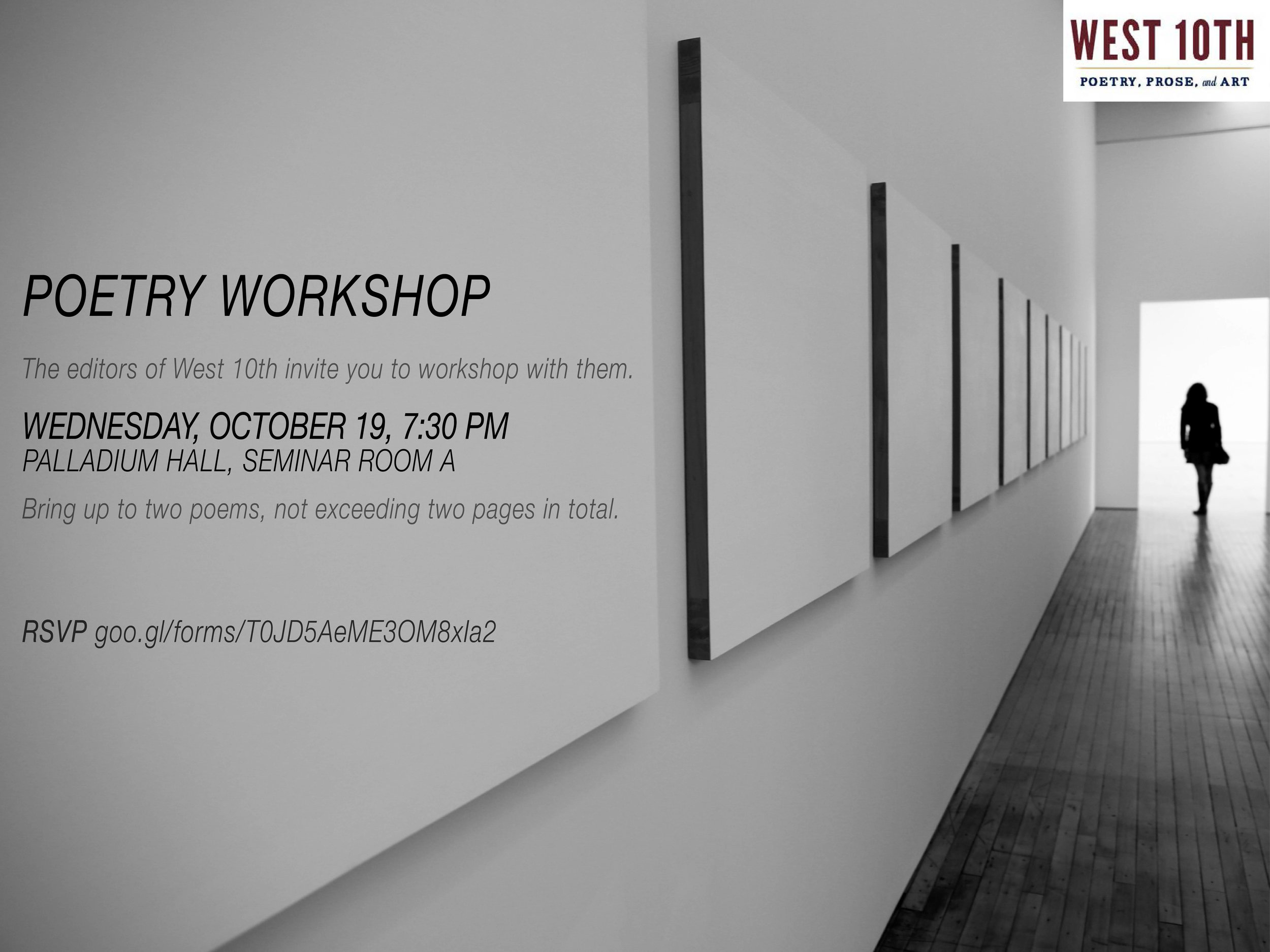 Bring up to two works of poetry (two pages maximum) to receive some feedback from your West 10th Editors. See you there!Just a reminder that we are still
Bring up to two works of poetry (two pages maximum) to receive some feedback from your West 10th Editors. See you there!Just a reminder that we are still 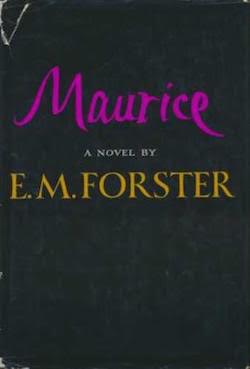 Written in 1913 but only published posthumously in 1971, Maurice was well ahead of its time in its nuanced depiction of a young man discovering and coming to terms with his sexuality. While Forster carefully examines the difficulties of identity and love, Maurice is ultimately founded on the belief that same-sex relationships have the capacity to be profound, beautiful and happy—a radical thesis for a novel written when men were still routinely arrested and imprisoned for having sex with other men.
Written in 1913 but only published posthumously in 1971, Maurice was well ahead of its time in its nuanced depiction of a young man discovering and coming to terms with his sexuality. While Forster carefully examines the difficulties of identity and love, Maurice is ultimately founded on the belief that same-sex relationships have the capacity to be profound, beautiful and happy—a radical thesis for a novel written when men were still routinely arrested and imprisoned for having sex with other men.  Subtitled “A Biography,” Orlando was written as a paean to Woolf’s friend and erstwhile lover, the aristocratic Vita Sackville-West. With typical élan, Woolf transforms Sackville-West into the novel’s eponymous protagonist, a sex-changing immortal who begins as an Elizabethan nobleman and ends as a successful female author in ‘the present day’ (that is to say, 1928). Traversing three hundred years of Orlando’s life, Woolf relentlessly questions conventional notions of history, authorship, gender and sexuality. Nightwood - Djuna Barnes (1936)
Subtitled “A Biography,” Orlando was written as a paean to Woolf’s friend and erstwhile lover, the aristocratic Vita Sackville-West. With typical élan, Woolf transforms Sackville-West into the novel’s eponymous protagonist, a sex-changing immortal who begins as an Elizabethan nobleman and ends as a successful female author in ‘the present day’ (that is to say, 1928). Traversing three hundred years of Orlando’s life, Woolf relentlessly questions conventional notions of history, authorship, gender and sexuality. Nightwood - Djuna Barnes (1936)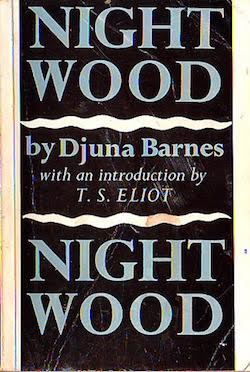 Contained in a deceptively slim volume, Nightwood is a superbly stylized portrait of a doomed lesbian relationship in the bohemian Paris of the interwar years, explicated through the head-spinning speeches of Dr. Matthew-Mighty-grain-of-salt-Dante-O'Conner (who is just as campy as his name suggests). This modernist masterpiece was lauded by T.S. Eliot as “so good a novel that only sensibilities trained on poetry can wholly appreciate it.” Notre Dame des Fleurs/Our Lady of the Flowers - Jean Genet (1943)
Contained in a deceptively slim volume, Nightwood is a superbly stylized portrait of a doomed lesbian relationship in the bohemian Paris of the interwar years, explicated through the head-spinning speeches of Dr. Matthew-Mighty-grain-of-salt-Dante-O'Conner (who is just as campy as his name suggests). This modernist masterpiece was lauded by T.S. Eliot as “so good a novel that only sensibilities trained on poetry can wholly appreciate it.” Notre Dame des Fleurs/Our Lady of the Flowers - Jean Genet (1943)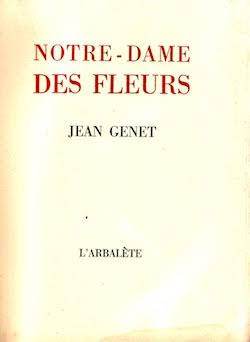 Similarly to Nightwood, this novel renders the Parisian underworld in prose so rich and revelatory it practically creates a new class of literature. The lives and loves of its central characters—sex workers, trans women, and teenage murderers, all bearing charming monikers like Divine and Darling Daintyfoot—are unspooled by a capricious narrator who creates the world of the novel while masturbating in his prison cell (!!!). The Charioteer - Mary Renault (1953)Renault, having worked as nurse at a British military hospital during the Second World
Similarly to Nightwood, this novel renders the Parisian underworld in prose so rich and revelatory it practically creates a new class of literature. The lives and loves of its central characters—sex workers, trans women, and teenage murderers, all bearing charming monikers like Divine and Darling Daintyfoot—are unspooled by a capricious narrator who creates the world of the novel while masturbating in his prison cell (!!!). The Charioteer - Mary Renault (1953)Renault, having worked as nurse at a British military hospital during the Second World 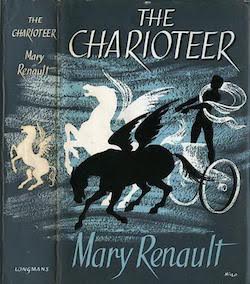 War and later emigrated to South Africa to live with her female partner, was uniquely equipped to write this novel, which follows a British soldier who falls in love twice over as he recovers from a combat wound. With equal measures of heartfelt psychological insight and cutting social observation, The Charioteer struggles with the tensions between idealism and reality, individualism and community, and innocence and experience. Another Country - James Baldwin (1962)An earlier novel of Baldwin’s, Giovanni’s Room, is often hailed as a masterpiece of gay literature, but while Giovanni’s Room is a claustrophobic investigation of one man’s psychology, Another Country seems to encompass an era.
War and later emigrated to South Africa to live with her female partner, was uniquely equipped to write this novel, which follows a British soldier who falls in love twice over as he recovers from a combat wound. With equal measures of heartfelt psychological insight and cutting social observation, The Charioteer struggles with the tensions between idealism and reality, individualism and community, and innocence and experience. Another Country - James Baldwin (1962)An earlier novel of Baldwin’s, Giovanni’s Room, is often hailed as a masterpiece of gay literature, but while Giovanni’s Room is a claustrophobic investigation of one man’s psychology, Another Country seems to encompass an era. 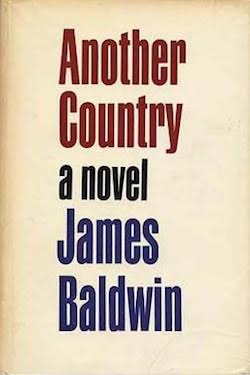 The characters are gay, straight, bisexual, questioning and in denial; white and black; working-class and middle-class and destitute and wildly successful. In a rhythm reminiscent of jazz, the novel traces the cast as they move in and out of each other’s lives, coupling and splitting up and getting back together, rising and falling in fortune—but always circling around the specter of a character who commits suicide at the end of the novel’s first act.
The characters are gay, straight, bisexual, questioning and in denial; white and black; working-class and middle-class and destitute and wildly successful. In a rhythm reminiscent of jazz, the novel traces the cast as they move in and out of each other’s lives, coupling and splitting up and getting back together, rising and falling in fortune—but always circling around the specter of a character who commits suicide at the end of the novel’s first act. This workshop is open to all undergrad students! So bring up to 1500 words of fiction/non-fiction prose to receive some feedback and comments from your West 10th Editors.Just a reminder that we are still
This workshop is open to all undergrad students! So bring up to 1500 words of fiction/non-fiction prose to receive some feedback and comments from your West 10th Editors.Just a reminder that we are still 
